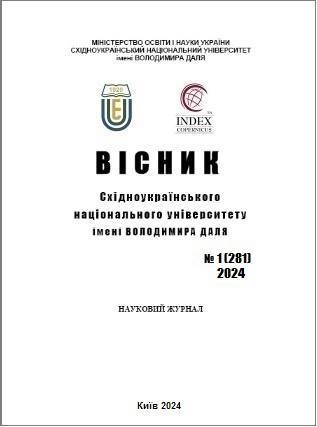Personal income tax transformation: arguments, public response, implementation and digitization under martial law
DOI:
https://doi.org/10.33216/1998-7927-2024-281-1-11-19Keywords:
personal income tax, progressive rate, taxation, tax awareness, digitalizationAbstract
In the context of modern challenges, which are the military conflict and the active digitization of the economy, this scientific article offers an analysis of the impact of the progressive system of income tax on individuals on social aspects. The study is aimed at studying the role of reforming the personal income tax system in the context of modern challenges and aims to consider aspects related to the military conflict and the transition to the digital economy.
The scientific novelty of the article consists in a comprehensive study of the relationship between the taxation system and social aspects in the conditions of martial law and digitalization. The analysis highlights new aspects of the use of digital technologies in the optimization of the tax system. Applied research methods include analysis of legislation, empirical observations, comparative analysis of social reactions, as well as technical and organizational aspects of practical implementation of changes in the order of tax payment.
Theoretical and practical results include arguments for changing the personal income tax rate in the conditions of martial law, consideration of social aspects and public reaction, analysis of the practical implementation of changes, and determination of the role of reforming the personal income tax payment system in the context of digitalization of the economy. The article examines the arguments for changing the personal income tax rate in the conditions of martial law, considers social aspects and public reaction to the change in the tax payment system, analyzes the practical implementation of changes to the current legislation on the payment of personal income tax, substantiates the role of reforming the personal income tax payment system in the context of digitalization of the economy and increasing tax awareness.
The conclusions of the article emphasize the importance of considering the social aspects of taxation in the context of modern challenges. Reforming the personal income tax payment system in the context of digitalization allows increasing the efficiency and transparency of the tax system, as well as convenience for citizens and businesses. Special emphasis is placed on digital access to tax services and increasing tax awareness through the implementation of educational initiatives. In general, this article makes a significant contribution to the study of social aspects of taxation in the conditions of military conflict and digitalization of the economy, and also contributes to the development of tax policy strategies in the conditions of modern transformations.
References
1. Гордєєва-Герасимова Л. Особливості оподаткування доходів фізичних осіб. Вісник ХНУ: Економічні науки. 2022. № 5, Том 1. С. 113-119
2. Дема Д.І. Шевчук І.В. Спрощена система оподаткування: реалії та перспективи в Україні. Облік і фінанси АПК. 2011. № 1. С. 146-149.
3. Дутова Н.В. Лесик Е.С. Оподаткування доходів фізичних осіб у Україні: проблема та вдосконалення на базі досвіду зарубіжних країн. Економіка і організація управління. 2019. № 1 (33). С. 43-52.
4. Заяць О.І., Теплова Л.І. Диференціація ставок ПДФО в країнах-членах ЄС. Науковий вісник Ужгородського національного університету: Міжнародні економічні відносини та світове господарство. 2022. Випуск 42. С. 59-63
5. Кміть В.М., Грабельський Б.Б. Оподаткування доходів фізичних осіб: проблеми та перспективи розвитку в Україні. Східна Європа: економіка, бізнес та управління. 2018. № 17. С. 542-547.
6. Кривуля П.В., Кулаков Є.В. Купівельна платоспроможність у системі показників сфери обміну та у оцінюванні стану регіональних економік. Підприємництво і торгівля: тенденції розвитку: матеріали ІV Міжнародної науково-практичної конференції (20-21 травня 2021 року), Одеса: Державний університет «Одеська політехніка», 2021. С. 405.
7. Кулаков Є. В., Кушал І. М. Податкова обізнаність суспільства, як рушійний чинник розвитку електронної демократії. Вісник Східноукраїнського національного університету імені Володимира Даля. 2022. №6 (276). С. 26-30
8. Купчинська Н. Переваги та недоліки застосування прогресивної ставки податку на доходи з фізичних осіб. Економічний дискурс. Міжнародний збірник наукових праць. 2014. Вип. 2. С. 279-282.
9. Кушнір В.В. Прогресивна система оподаткування. Сучасні тенденції економічного зростання: стратегії, напрями та пріоритети. Міжнародна економіка: матеріали IIІ міжнародної науково-практичної конференції (14 грудня 2019 року), Запоріжжя: Східноукраїнський інститут економіки та управління, 2019. С. 63.
10. Литвиненко Я. Удосконалення системи оподаткування доходів фізичних осіб в Україні. Наукові записки Національного університету «Острозька академія». Сер.: Економіка. 2012. Вип. 19. С. 49-51.
11. Маліновська К.О. Податок на доходи фізичних осіб: прогресивна чи фіксована податкова ставка? Інформаційно-аналітичне забезпечення управління фінансово-економічною безпекою держави, регіону, суб’єктів господарювання в умовах COVID-19. матеріали Х Міжнар. наук.-практ. конф. (18-19 листопада 2021 року), Харків : ХНУМГ ім. О. М. Бекетова, 2021 С. 156-158
12. Покатаєва О.В. Правові основи функціонування спрощеної системи оподаткування. Вісник Запорізького національного університету. 2010. № 4. С. 85-90.
13. Рядінська В. Доцільність прогресивного оподаткування доходів фізичних осіб. Наука і правоохорона. 2013. №8. С. 196-201
14. Сидоренко Р.В. Спрощена система оподаткування в Україні: історія і перспективи. Збірник наукових праць Таврійського державного агротехнологічного університету (економічні науки). 2012. № 1(17). С. 138-145.
15. Тучак Т. В. Соціалізація оподаткування доходів фізичних осіб: зарубіжний досвід та вітчизняна практика. ModernEconomics. 2019. № 17. С. 226-231. DOI: https://doi.org/10.31521/modecon.V17(2019)-36.

